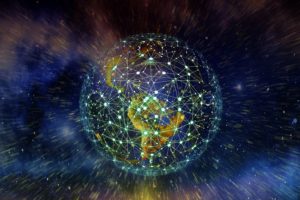 There’s a beautiful metaphor in Buddhist writing about Indra’s Net. In the stories, it’s a large (possibly infinite) net hung over Indra’s palace that has a multifaceted jewel at each intersection. Each of these jewels reflects back every other jewel.
There’s a beautiful metaphor in Buddhist writing about Indra’s Net. In the stories, it’s a large (possibly infinite) net hung over Indra’s palace that has a multifaceted jewel at each intersection. Each of these jewels reflects back every other jewel.
It’s a powerful illumination of the Buddhist approach to interconnection. That each of us has an impact on and is a reflection of the world around us.
And this interconnection is on full display during a global pandemic. Not only in the spread of the virus but in our ability or inability to counter it.
The Interconnected Global System
 Not only have we seen how interconnected we are, but also how fragile the overall system could be. Very few people were contemplating what would happen if millions (billions?) of people had to quarantine themselves before this happened.
Not only have we seen how interconnected we are, but also how fragile the overall system could be. Very few people were contemplating what would happen if millions (billions?) of people had to quarantine themselves before this happened.
And that’s a problem. Because even though the spread of a global virus was a black swan event (which are explicated so well by Nassim Taleb), we knew that it was a possibility. Heck, there were even Netflix documentaries on the possibilities of pandemics that came out months before it exploded.
So why didn’t we take action? One of the challenges of improving a system is that you can’t always see a system’s weak points until it breaks. And the more variables that are involved, the more opaque the system is.
Which is why it’s challenging to address a system’s problems (or even be aware of them) until it does break.
In other words, you can’t see how broken a system will be until it breaks. Business as usual seems like a good idea until it isn’t. And we can ignore inadequacies when we’re not being called to pay the price for them.
Until you’re left cleaning up the mess.
Learning from System Malfunctions
However, in the midst of this breakdown, there is a chance to learn and grow. When a system grinds to a limp or a halt, it puts up a big sign that points directly at its weaknesses.
We can see this on a society-wide level where economies are struggling to manage when many people can’t congregate and physically engage with each other.
And we can see this on an individual level. Not only because we are parts of that larger system, but because the pieces of our lives are also interconnected with each other. Just like a virus that first appears in one country can quickly circle the globe, so too can one aspect of our lives influence and impact the other parts.
Unfortunately, we’re often too busy putting out fires to pay attention to the lessons that are staring us in the face.
But if you can pay attention, you can walk away with valuable insights and information.
Remember the Weakest Links
 I’m not sure if the coronavirus pandemic will really create sustained and systemic change. I’d like to think that it will. But humans are pretty resilient to learning lessons. In the midst of any crisis, we promise ourselves that the future will be different. But then life gets back to normal… and we forget the lessons.
I’m not sure if the coronavirus pandemic will really create sustained and systemic change. I’d like to think that it will. But humans are pretty resilient to learning lessons. In the midst of any crisis, we promise ourselves that the future will be different. But then life gets back to normal… and we forget the lessons.
So it’s on you to create the change you want to see.
You might not be able to make societal changes, but you do have the ability to shift how you behave. The key is remembering the insights that you are learning, often painfully, right now. Put a note to yourself in your phone, ask Alexa to remind you in two months, or put a meeting in your planner for June 1st.
Have something that makes you remember what you were thinking and feeling in the moment as you look at what’s happening in your community, your career, your family, and your inner mind.
You have probably had some version of this thought in the past week:
“Wow, I wasn’t focused on _____ and now I realize how important it is.” You want to make sure that observation isn’t wasted.
Down the line, you might get the reminder you set and ignore it. Most people will. Or they won’t even schedule that reminder because they want to put their trials behind them as quickly as possible.
Or.
You might get that reminder and you might take action.
I hope you do.
That’s the first step on a different path.
